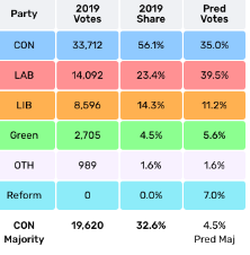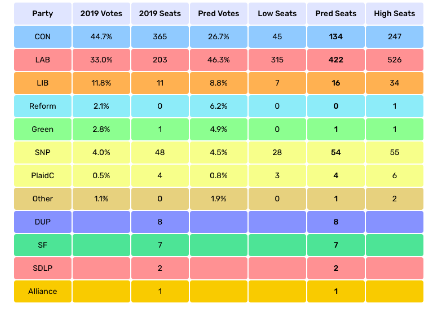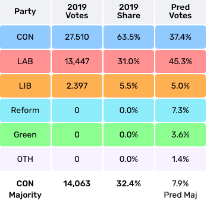January in Politics
By Josh Brown
This is Electoral Calculus’s prediction of what would happen if there was a general election tomorrow, and is a good gauge of where the national opinion is in relation to the different political parties. Labour is predicted to get a massive majority of 422 seats, even larger than Tony Blair’s record-breaking landslide victory of 418 seats in 1997. The Conservatives are due their worst result ever with 134 seats, unsurprising given the state of the party with Boris Johnson’s legacy and the aftershocks of Liz Truss’s disastrous premiership still being felt. The Liberal Democrats will remain the third-largest party by vote share, with 16 seats, while the Scottish National Party will increase their count from 48 to 54 seats as support for Scottish nationalism steadily rises. The remaining, so-called ‘minor’ parties will all retain their current number of seats.

< Local constituencies – Hertford & Stortford – is expected to be narrowly won by Labour, a shocking result given that the seat has been Conservative for every single election since it was created in 1983. Support for the Greens and the far-right Reform Party (formerly the Brexit Party) has slowly risen.
Local constituencies – Harlow – is again expected to be narrowly won by Labour. Harlow usually votes broadly in line with how the nation as a whole vote, with Labour expected to win the seat by 7.9% of the vote. Support for the Greens and the far-right Reform Party (formerly the Brexit Party) has also risen slightly.
10th January - Minimum Service Levels Bill
The Gender Recognition Reform Bill was approved by the Scottish parliament at the end of last year, and aims to make it easier for those wishing to change their gender to do so, with the minimum age requirement lowered from 18 to 16. However, the Westminster government has blocked the new bill, preventing it from being made into a law – a move that has never occurred in the history of the Scottish Parliament since it was formed 25 years ago.
Nicola Sturgeon, the leader of the Scottish Parliament, has rallied against the government’s decision; she said, “There are some people that I think have decided to use women’s rights as a sort of cloak of acceptability to cover up what is transphobia.
“But there are people who have opposed this bill that cloak themselves in women’s rights to make it acceptable, but just as they’re transphobic you’ll also find that they're deeply misogynist, often homophobic, possibly some of them racist as well.”
Those who support the blocking of the bill have raised concerns it will allow men to easily change their gender to prey on women and enter women-only safe spaces.
Nicola Sturgeon, the leader of the Scottish Parliament, has rallied against the government’s decision; she said, “There are some people that I think have decided to use women’s rights as a sort of cloak of acceptability to cover up what is transphobia.
“But there are people who have opposed this bill that cloak themselves in women’s rights to make it acceptable, but just as they’re transphobic you’ll also find that they're deeply misogynist, often homophobic, possibly some of them racist as well.”
Those who support the blocking of the bill have raised concerns it will allow men to easily change their gender to prey on women and enter women-only safe spaces.
16th January – the government blocks Scotland’s Gender Recognition Reform Bill
The Gender Recognition Reform Bill was approved by the Scottish parliament at the end of last year, and aims to make it easier for those wishing to change their gender to do so, with the minimum age requirement lowered from 18 to 16. However, the Westminster government has blocked the new bill, preventing it from being made into a law – a move that has never occurred in the history of the Scottish Parliament since it was formed 25 years ago.
Nicola Sturgeon, the leader of the Scottish Parliament, has rallied against the government’s decision; she said, “There are some people that I think have decided to use women’s rights as a sort of cloak of acceptability to cover up what is transphobia.
“But there are people who have opposed this bill that cloak themselves in women’s rights to make it acceptable, but just as they’re transphobic you’ll also find that they're deeply misogynist, often homophobic, possibly some of them racist as well.”
Those who support the blocking of the bill have raised concerns it will allow men to easily change their gender to prey on women and enter women-only safe spaces.
Nicola Sturgeon, the leader of the Scottish Parliament, has rallied against the government’s decision; she said, “There are some people that I think have decided to use women’s rights as a sort of cloak of acceptability to cover up what is transphobia.
“But there are people who have opposed this bill that cloak themselves in women’s rights to make it acceptable, but just as they’re transphobic you’ll also find that they're deeply misogynist, often homophobic, possibly some of them racist as well.”
Those who support the blocking of the bill have raised concerns it will allow men to easily change their gender to prey on women and enter women-only safe spaces.
19th January – Prime Minister Rishi Sunak found guilty of breaking the law for not wearing seatbelt in car
The Prime Minister was been fined for not wearing a seatbelt in a moving car while filming a video – designed to promote the government’s latest round of ‘levelling up’ spending – for his Instagram page. Lancashire Police said it had issued a 42-year-old man from London, later identified to by Rishi Sunak, with a conditional offer of a fixed penalty of £100. No. 10 said Mr Sunak “fully accepts this was a mistake and has apologised”, adding that he would pay the fine. Speaking to BBC Breakfast, the deputy prime minister Dominic Raab (who is under investigation for several allegations of bullying) said Sunak was “someone with the highest standards of integrity” who had “made a mistake on the seatbelt issue”. He went on to say the PM was “a human being doing a demanding job” and had “put his hands straight up” and apologised.
This is the second time Sunak has broken the law while in government - last April, he was fined along with Boris Johnson for breaking Covid-19 lockdown rules that he helped to write - by attending a birthday gathering for the then-prime minister in Downing Street in June 2020. Makes Sunak the first serial offender in the history of UK Prime Ministers.
Labour’s deputy leader Angela Rayner said in a tweet that Mr Sunak was a “total liability”. A Labour Party spokesperson added: “Hapless Rishi Sunak's levelling-up photo op has blown up in his face and turned him into a laughing stock.”
Daisy Cooper, the deputy leader of the Liberal Democrats (the third-largest political party by vote share) leader said: “From partygate to seatbelt gate, these Conservative politicians are just taking the British people for fools. Whilst they continue to behave as though it’s one rule for them and another for everyone else, this fine is a reminder that the Conservatives eventually get their comeuppance.”
This is the second time Sunak has broken the law while in government - last April, he was fined along with Boris Johnson for breaking Covid-19 lockdown rules that he helped to write - by attending a birthday gathering for the then-prime minister in Downing Street in June 2020. Makes Sunak the first serial offender in the history of UK Prime Ministers.
Labour’s deputy leader Angela Rayner said in a tweet that Mr Sunak was a “total liability”. A Labour Party spokesperson added: “Hapless Rishi Sunak's levelling-up photo op has blown up in his face and turned him into a laughing stock.”
Daisy Cooper, the deputy leader of the Liberal Democrats (the third-largest political party by vote share) leader said: “From partygate to seatbelt gate, these Conservative politicians are just taking the British people for fools. Whilst they continue to behave as though it’s one rule for them and another for everyone else, this fine is a reminder that the Conservatives eventually get their comeuppance.”

